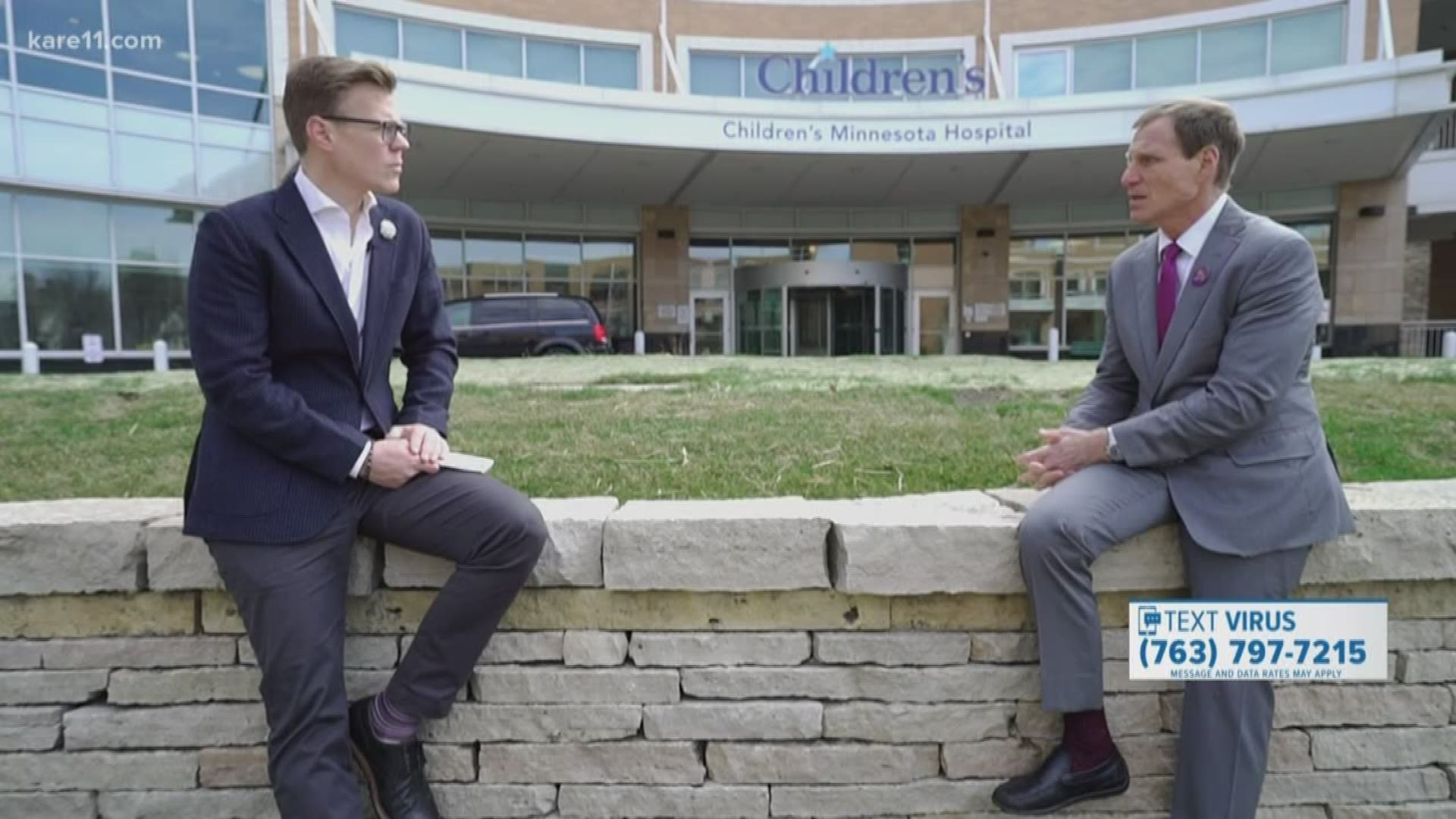MINNEAPOLIS — Though children have largely avoided serious symptoms of COVID-19 worldwide, they are not immune to the novel coronavirus.
CEO of Children's Minnesota, Dr. Marc Gorelick, spoke to us about how they are addressing a growing number of cases and concerns from families who rely on them for care.
This week Dr. Gorelick said Children's Minnesota treated multiple mild, outpatient cases and also took in its first hospitalized case.
"We have a separate area where we are keeping patients who have COVID-19 or are suspected of having COVID-19," Dr. Gorelick said. "We can cohort them and try to protect the staff and the patients and their families."
For weeks, Children's Minnesota has asked parents of kids with COVID-like symptoms to call a nurse-line before traveling to a hospital or clinic. Guests at the hospital are now limited to legal guardians and they are all screened at the entrance along with employees. A tent in the parking lot outside Children's Minnesota campus in Minneapolis is now performing coronavirus testing for employees who might need one.
Check out the video below for the full interview:
Kent Erdahl: What would you tell families that might have sick kids or critical appointments if they are concerned or scared of coming in here?
Dr. Gorelick: "We've done as much as we can to try and separate people who are sick from people who are well. We're having some clinics providing well-child services and some that are open for those who are sick so we can try to minimize exposure. We've also, just today, started our drive-up vaccine service. Families can come in and they can get their family's well-child shots without having to come into the building and, therefore, minimizing their exposure as well."
Erdahl: "Several healthcare systems, including in Minnesota, have gone to universal masking. Is that something Children's has done at this point?"
Dr. Gorelick: "We have started doing that (Tuesday), so all of our staff who are in patient-facing roles, or patient care areas, are being asked to wear masks."
Erdahl: "How are you doing right now in terms of that protective equipment?"
Dr. Gorelick: "We're all in really tight supply so we're having to really conserve it. We are all trying to strike a balance, making sure that we're providing them everything they need, but being very mindful of the very short supply we have. We're also prepared to serve as an overflow for the other hospital systems in the state, who are trying to free up capacity to take care of adults. So that we can do what we do best, take care of kids, allow them to do what they do best, take care of adults."
Erdahl: "You have canceled a lot of elective procedures and everything else, like a lot of other healthcare systems, that can be a strain financially. Are there going to have to be some tough decisions made with staffing and decisions?"
Dr. Gorelick: "All of the healthcare systems are in the same situation. We've all cut back dramatically on procedures that can be deferred and that is having a huge financial impact. All the health systems are seeing that. At this point we're still evaluating what we think that might look like going forward, how long we might continue to defer those procedures. Keep in mind, just because something can wait, doesn't mean it never gets done. In the end, I think all of us are going to be figuring out, how do we best manage our costs and be able to stay financially sound in light of a dramatic reduction in our revenues right now."
Erdahl: "Will that translate to cuts in staffing in certain areas?"
Dr. Gorelick: "We don't know yet. Right now we know we have areas where we don't have as much activity going on and we are working to identify how we best match the staffing to the needs, so we have people who have been redeployed, maybe doing jobs they don't normally do, getting retrained for things. As this progresses and unfolds, we will consider all the other options that we may need."
Erdahl: "What do you want to say to your staff members here, whether they're on the front lines in healthcare roles, or working the buildings, all the way down to people helping keep everything clean?"
Dr. Gorelick: "First of all, our staff are doing an amazing job of pulling together and doing what they need to do to take care of the kids an families who rely on us, take care of each other and keep everybody safe. The thing about this whole crisis is, every day we learn more and more and as we get the best new information, we will continue to do everything we possibly can based on that best information to protect them and keep them safe and healthy."
You can find the full interview, here.
KARE 11’s coverage of the coronavirus is rooted in Facts, not Fear. Visit kare11.com/coronavirus for comprehensive coverage, find out what you need to know about the Midwest specifically, learn more about the symptoms, and see what companies in Minnesota are hiring. Have a question? Text it to us at 763-797-7215. And get the latest coronavirus updates sent right to your inbox every morning. Subscribe to the KARE 11 Sunrise newsletter here. Help local families in need: www.kare11.com/give11.
The state of Minnesota has set up a hotline for general questions about coronavirus at 651-201-3920 or 1-800-657-3903, available 7 a.m. to 7 p.m.

